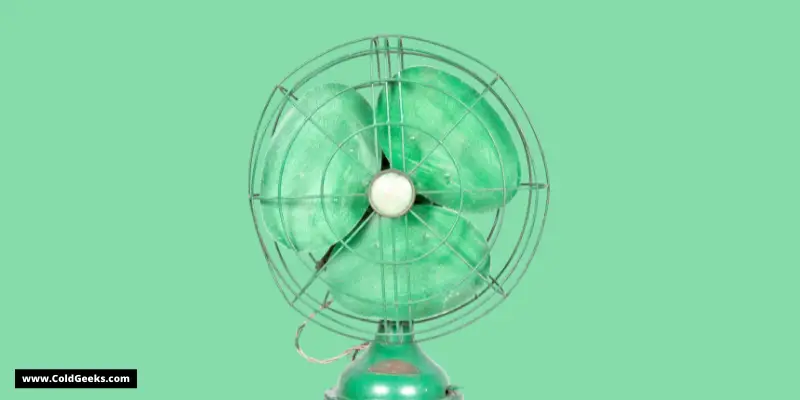Fans don’t last forever, and it’s a good idea to know how long you can count on them.
How long do fans last?
Fans usually last between 0-30 years. Most fans will last up to 10,000 hours or more of continuous use. How long a fan lasts is determined by the amount of use, the environment, the type of fan, the materials used to build the fan, and how well the fan is maintained.
In this article, I’ll share with you how long 21 different types of fans typically last.
How Long Do Fans Last? (Easy Chart)

Since there are so many different kinds of fans, I thought I would make a chart.
I did my best to cover the most common fans people ask me about (in terms of lasting power).
Scroll through this list until you find the fan you are looking for (Hint: It’s in alphabetical order):
| Type of Fan | How Long They Last (Average) |
|---|---|
| Attic Fans | 10-15 years |
| Aquarium Fans | 6-8 years |
| Bathroom Fans | 9-12 years |
| Battery Fans | 3-12 hours (before recharging) |
| Car Fan | 8-10 years |
| Ceiling Fan | 6-10 years |
| Computer Fan/Case Fan | 5-10 years |
| Desk Fan | 5-8 years |
| Exhaust Fan | 9-12 years |
| Extractor Fan | 9-12 years |
| Floor Fan | 1-3 years |
| Furnace Fan | 15-20 years |
| Inline Fan | 5-10 years |
| Laptop Fan | 5-7 years |
| Neck Fan | 1-3 years |
| Outdoor Fan | 6-10 years |
| Radon Fan | 5-10 years |
| Stove Fan | 5-10 years |
| Standing Fans/Pedestal Fan | 3-5 years |
| Tower Fan | 3-5 years |
| Window Fan | 3-5 years |
Keep in mind that these are just averages—some fans may last longer or shorter than these ranges.
How Long Do Room Fans Last?
Room fans include floor fans, window fans, and table fans.
They can last from 1-3 years if used nonstop every day, or up to 5-8 years if used less frequently.
Cheaper models usually go out sooner than more expensive models.
Floor fans tend to run faster than other fans (such as ceiling fans) and collect more dirt, debris, and pet dander.
How Long Do Ceiling Fans Last?
Ceiling fans can last a long time if they are used infrequently and at lower settings—up to 20 years or more.
However, if they are used every day at full speed, they will generally last about 6-10 years (maybe not even that long).
Outdoor fans exposed to harsher temperatures and weather usually give out sooner than indoor fans, even though outdoor fans are made of heavy-duty materials.
However, if your outdoor fan is sheltered by a covering, it may last much longer than indoor fans.
How Long Do Standing Fans Last?
Standing fans (or pedestal fans) usually last up to 3-5 years.
Pedestal fans can tip over more easily, leading to damage that requires repair. Standing fans also sit on the floor so pets and small children more easily access them.
Like other floor fans, standing fans attract dust and other debris that can clog up the fan blades and motor.
All of this increases the risk of a standing fan getting damaged and needing to be replaced.
How Long Do Laptop Fans Last?
In my experience, a laptop fan’s average lifetime is approximately 50,000 hours (or 5.7 years).
The fans in laptops get a lot of use and can overheat quickly, which can damage the device.
The harder you run them, the sooner they will die.
As with any fan, it’s important to keep your laptop clean so the fan has good airflow and lasts as long as possible.
How Long Do PC Fans Last?
Computer or case fans tend to last 5-10 years.
I know some friends who still use their PC fans from twelve years ago.
Computers usually use more than one fan, so if a fan wears out, it can severely impact the other fans around it.
PC fans are also small and tend to wear out more quickly with overuse.
How Long Do Server Fans Last?
Server fans can last for 3-5+ years without much trouble at all.
I’ve known servers to last for 5-10 years, and one of my clients kept a server fan running for closer to 20.
Server fans are meant to last a long time, even with continual use. They are large and more expensive than most other kinds of fans.
Most server fans have sensors that automatically alert you if something is wrong, and most need to be serviced every year.
How Long Do Box Fans Last?
Box fans can last from 1-2 years if used for 8 hours a day.
They can last around 5 years or more if used less frequently. Then again, with proper care and maintenance, some box fans will run smoothly for 15 or more years.
5 Things That Determine How Long Fans Last
Certain factors affect how long your fan will last.
Some of these factors are in your control, while others rely on quality materials or blind luck.
Here are five things that determine how long your fan will last:
- Materials in the fan
- Type of fan
- The environment
- Maintenance
- Amount of use
Materials in the Fan
If your fan is made of high-quality materials, it will last longer than a fan made of low-quality materials.
It’s important to look for fans that have metal blades (or other high-quality material) instead of cheap plastic ones.
Metal blades are more durable and less likely to warp or break.
Fans with sealed motors and wet-rated materials usually last longer than those with unprotected motors.
Type of Fan
The type of fan you buy also determines how long it will last.
Ceiling fans and PC fans can last much longer than box fans or neck fans. Different models of fans within the same brand can even last for different amounts of time.
As you might suspect, more expensive fans tend to last longer than cheaper fans.
The Environment
The environment you place your fan in also impacts its lifespan.
Environments with high levels of humidity, dust, air circulation, and moisture can significantly shorten your fan’s duration.
For example, if you place your box fan or standing fan in an area with poor airflow or too much heat for long periods of time, they are more likely to break down faster.
Maintenance
Taking good care of your fans will help them last much longer. I suggest that you create a routine of weekly (or monthly) cleaning.
This has allowed some of my fans to last two or three times longer than expected.
Here are some cleaning tips:
- Use a can of compressed air (or that compressed air at the gas station meant for tires), to blow dust out of the fan.
- Use a soft microfiber cloth to clean the outside of the fan.
- For many smaller fans, you can remove the blades and grille. Soak them in water mixed with dish detergent for thirty minutes, dry them out completely, and put them back on your fan.
Amount of Use
How much you use your fan will also change how long it lasts.
Fans that get used a lot tend to wear out more quickly than those that are used less. It’s a good idea to limit how long you use your fan each day.
For example:
- Turn your fan off at night
- Use a timer
- Use a temperature-controlled fan (that shuts off at certain degrees)
- Use your fan on low-speed settings
Is It Bad To Run Fans All the Time?
I don’t recommend running your fans 24/7.
Like many other appliances, fans consume electricity even when you aren’t using them. Running your fans constantly can lower the lifespan of your fan by up to 25-50%.
If you must run your fan for long periods of time, try to find a model with high energy efficiency. Also, be aware that you will likely need to put more maintenance into your fans (and replace them more often).
Why Don’t Fans Last Forever?
You might be wondering why fans don’t last forever. Sure, the companies want you to buy more fans and replacement parts.
But why else don’t they last forever?
The main reasons are often:
- Rapid temperature changes
- Cheaper materials that crack or leak
- Electromigration
- User error
Of course, some scrupulous companies sometimes intentionally create products that break down after warranty periods end.
Here is a very good video that covers this topic in detail:
Final Thoughts: How Long Do Fans Last?
Other than buying a better fan, the best thing you can do to extend the lifespan of your fan is to clean it.
If you leave dust building up too long, the dust may eventually buffet airflow back into the fan (thus damaging it over time).
